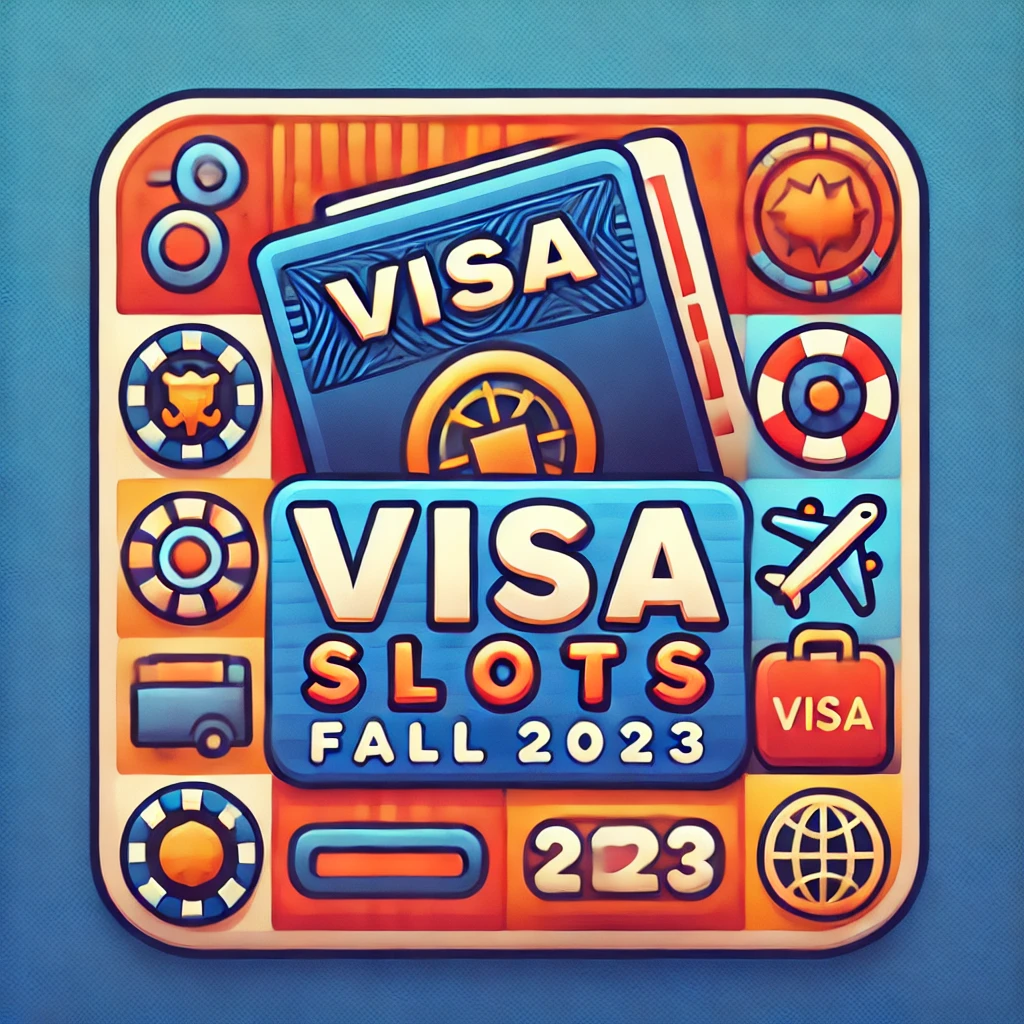
Managing the Difficulties of Student Visa Applications Visa slots are the few times that embassies and consulates offer appointments for visa interviews. For students who want to study overseas, these times are essential because they dictate when candidates can make their cases to visa officers. Depending on the time of year, the nation in which the application is made, and the particular visa category, the availability of these slots can change dramatically.
Because it directly affects their ability to obtain a visa in time for their planned academic start date, students must comprehend the dynamics of visa slots. Slots may fill up quickly during periods of high application volume, like before the fall semester, which increases applicant competition. Also, booking a visa slot frequently requires navigating an online booking system, which can be frustrating & confusing. Numerous students experience anxiety and uncertainty as a result of competing for a small number of spots.
It's critical that candidates keep up with the opening of new positions and take prompt action when they do. Also, a student's chances of getting a visa slot can be greatly increased by being aware of the subtleties of the application process, such as the necessary paperwork & interview preparation. Students can improve their chances of landing an appointment and eventually completing their studies overseas by being proactive and well-organized. Typical Causes of Student Visa Denials. There are many reasons why student visa applications may be denied, which frequently leaves applicants confused and discouraged.
A common explanation is a lack of sufficient financial evidence. Visa officers must be persuaded that applicants have the money needed to sustain themselves while they are in school and avoid taking on illicit work. Documentation and Financial Requirements. Students' applications may be rejected if they do not submit sufficient bank statements or other financial records attesting to their capacity to pay for living expenses and tuition.
Also, inconsistent information can raise red flags for visa officers and result in rejection. For example, there may be differences between the application form & supporting documents. Having a sincere desire to learn.
The applicant's inability to prove a sincere desire to study is a major contributing factor to visa denials. Visa officers are educated to determine whether applicants have more than one reason for applying for a student visa or if they are genuinely dedicated to their academic goals. The applicant's academic background, the program's fit with their career objectives, and their ties to their nation of origin are frequently evaluated as part of this evaluation.
A candidate may be considered a possible immigration risk and have their visa application denied if they are unable to clearly explain their study goals or demonstrate a strong bond with their nation of origin. As students get ready for the next school year, it's important to know how many visa slots are available for Fall 2023. During this time, student visa applications spike in many countries, creating a high demand for interview slots. For instance, in advance of the fall semester, a large number of international students usually apply for visas to nations like the US, Canada, and Australia. In order to keep track of visa slot availability, prospective students must keep an eye on official government websites and embassy announcements.
Students can gain a competitive edge by being aware that some embassies may release more spots as they get closer to periods of high application demand. Students should think about other methods in addition to keeping an eye on availability in order to guarantee a visa slot. A few embassies provide priority appointments or expedited processing options for specific applicant categories, like those who have been awarded scholarships or are enrolled in programs with high demand. By looking into these choices & being adaptable with their travel schedules, students can improve their chances of getting an appointment on time. Also, participating in online forums or networking with other students can offer insightful information about the experiences of those who have successfully completed the visa application process during this hectic time of year.
Taking calculated measures to obtain a new visa slot is crucial for students who have had their first visa applications denied. Examining the reasons for rejection that the visa officer provided is the first step. Knowing these explanations enables students to successfully correct any errors in their prior application. For example, students should obtain thorough proof of their financial stability before reapplying if financial documentation was missing. Examples of supporting documentation for their case could be sponsorship letters, recent bank statements, or evidence of scholarships. Students ought to reapply for a visa slot as soon as they have resolved the problems that caused their initial rejection.
A new application form must frequently be submitted, & any related fees must be paid again, as part of this process. Rejected students must take immediate action because visa spots can fill up quickly, particularly during busy times of the year. They should also think about getting advice from legal professionals who focus on immigration issues or educational consultants. These experts can offer customized guidance and assist students in making a more compelling application in the future.
It's crucial to pay close attention to the requirements and deadlines set by the individual embassies or consulates when navigating the student visa application process. The processing time for student visas varies by country & is contingent on a number of factors, including national policies & the volume of applications received. For example, in order to give processing time, many nations advise students to apply for their visas at least three months prior to the start date. If these deadlines are missed, enrollment may be delayed or even academic program opportunities may be lost. Understanding the particular requirements for each nation is crucial for a successful application, in addition to deadlines.
Valid identification documents like passports, financial records attesting to one's ability to support oneself while studying, and proof of acceptance into an accredited educational institution are typical prerequisites. As part of the application procedure, some nations might also demand police clearance certificates or medical exams. Students can greatly increase their chances of obtaining a student visa by carefully preparing all required documentation and meeting deadlines. Recognizing Visa Denial & Investigating Your Options. Even though students who have been rejected for a visa slot may feel discouraged, it's important to remember that they have a number of options going forward.
If permitted by the nation's immigration laws, one choice is to appeal the ruling. In order to complete this process, you usually need to submit extra supporting documentation or explanations that address the denial reasons. Examining Different Educational Pathways and Visa Alternatives. Students should be aware, though, that not all nations allow appeals, so before taking this course of action, they should review official regulations or obtain legal counsel. Another good choice would be to look into different educational options or apply for a different kind of visa.
Some students might decide to enroll in shorter courses or language programs, for example, which might have different visa requirements or less rigorous application procedures. Variable Admission Schedules and Other Programs. Students may also investigate schools that provide more accommodating admissions schedules or programs that begin at various times of the year.
Students can overcome any obstacles brought on by prior visa denials & maintain their academic goals by investigating these options. Prospective applicants can use a few crucial tactics to increase the likelihood that their student visa application will be accepted. Above all else, careful planning is crucial. This entails compiling all necessary paperwork well in advance and making sure it is correct and current. To make sure nothing is missed when submitting, students should make a list of all the documents they will need, including identification documents, financial statements, and consent letters.
Also, an applicant's confidence and performance on the day of the appointment can be greatly improved by practicing for the visa interview. Students should become familiar with typical interview questions & prepare succinct, understandable responses that demonstrate their sincere desire to study abroad. Anxiety can be decreased and the interview experience simulated by role-playing with friends or family. Also, keeping an optimistic outlook throughout the procedure can have a significant impact; showing visa officers that you are excited about studying abroad can make a good impression.
Many resources are available to help students who have had their visa applications denied navigate this difficult circumstance. Numerous academic institutions provide special assistance programs for overseas students, such as access to legal counsel on immigration-related matters and counseling on visa-related concerns. These resources can offer insightful advice on how to handle appeals or reapplications. Also, social media communities and online forums devoted to international education can act as venues for peers who have encountered comparable difficulties to exchange insights and counsel.
Rejected applicants looking for clarification on their next steps may find updated information on policies and procedures on student visa websites helpful. Students who successfully utilize these resources can arm themselves with information and assistance as they strive to obtain their student visas. To sum up, overcoming the challenges of student visa applications calls for perseverance, diligence, and preparation. Students can improve their chances of fulfilling their academic aspirations overseas in spite of early setbacks by comprehending important ideas like visa slots and reasons for rejection and making efficient use of the resources available.




